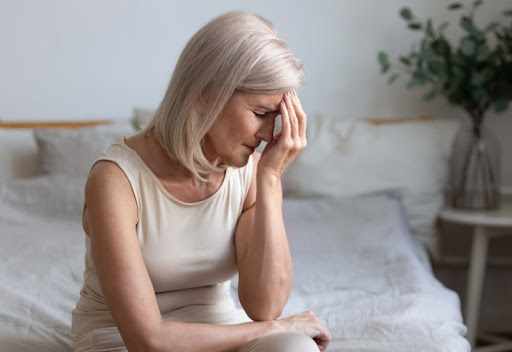Women experiencing changes in their gynecological health, such as heavier or lighter menstrual flow, should consult with their physician as soon as they notice unusual or persistent bleeding. This is especially important if the bleeding persists for more than three months or is otherwise unusual or worrying.
Hot flashes and night sweats may also be treated with medication; your physician can suggest a hormonal regimen in tablet, spray or patch form for you to take.
For Menopausal Care in Noida, visit Niraamaya Clinic.
Menopausal Symptoms
As women nearing late 40s approach menopause, their ovaries begin producing less progesterone and estrogen – hormones which regulate menstruation – which in turn causes periods to lighten or stop altogether. Periods may become lighter or shorter or may appear at shorter cycles – these changes are considered normal part of perimenopause stage.
Early in perimenopause, you may begin experiencing other menopausal symptoms, including hot flashes or vaginal dryness. Hormone therapy is designed to balance estrogen and progesterone levels to lessen menopausal symptoms – most effective at relieving hot flashes, night sweats and improving sleep as well as vaginal health.
Hot Flashes
Hot flashes are one of the hallmarks of menopause. These episodes typically consist of sudden surges of heat, flushing and sweating lasting several minutes and typically impact chest and face areas first.
Changes in mood are also common during perimenopause and menopause, due to fluctuating hormone levels that may leave women feeling anxious, sad or emotional.
Changes to one’s mood can have serious ramifications on a woman’s sex life and relationships. Many report feeling less sexually desirable and having difficulty engaging in sexual acts. Furthermore, mood swings may interfere with sleeping patterns, leading to fatigue or depression in their wake.
Night Sweats
Night sweats are intense hot flashes that occur while sleeping and leave clothes and sheets wet with perspiration, distinct from regular perspiration which might occur if your room temperature is too warm or you wear too many blankets.
Night sweats should always be reported to a healthcare provider if they occur frequently or interfere with your sleep, and especially if they accompany other health changes.
Night sweats typically do not present serious medical concerns; however, if they accompany fever, sudden weight loss, or coughing it is wise to seek medical advice immediately.
Weight Gain
Many women experience weight gain during and after menopause, often due to decreased oestrogen levels and age-related loss of muscle mass, which lowers metabolism. Poor sleep or unhealthy eating patterns could also play a factor.
Diet, exercise and menopausal hormone therapy can all work to combat weight gain. Alcohol should also be limited. Although making changes like these may be challenging if other life pressures arise; if necessary seek advice from your physician.
Depression
Ayurved treatment can help alleviate depression and boost your mood, but for optimal results it is wise to consult an expert in order to receive appropriate assistance – Niraamaya Clinic in Noida provides such specialists.
Dr. Alok Dwivedi is an esteemed doctor specializing in HIV/AIDS Sexually Transmitted Infections in Delhi with over 19 years of experience.
He specializes in vaccination/immunization, growth & development evaluation /management, bronchial asthma treatment. Please see his profile page for a full list of expertise.
Psychiatry involves diagnosing and treating mental illnesses. These may include depression, anxiety disorders, obsessive compulsive disorder (OCD), phobias or any other psychological conditions.
Bone Loss
Under 30 years old, our bones tend to accumulate more new bone than they reabsorb – this creates peak bone mass of maximum strength and density. Once we hit menopause when estrogen levels start dwindling, bone resorption outpaces bone formation resulting in bone loss accelerated further by menopausal estrogen depletion.
Osteoporosis increases the risk of broken (fractured) bones. Women tend to be affected by it more due to having thinner and less dense bones; however it can affect men too, particularly if their family history includes osteoporosis or fractures.
Vaginal Bleeding
Vaginal bleeding outside the normal menstrual cycle may be a telltale sign of gynaecological problems or medical conditions, or may indicate sexually transmitted infections like Chlamydia.
Teenagers and women approaching menopause frequently experience irregular periods that are lighter or heavier than usual, due to changes in hormones or major life events.
Abnormal uterine bleeding after menopause can be caused by any number of factors, including menorrhagia (shedding off of the lining of the uterus). Treatment options for this include iron replacement therapy and hormone medications; additionally fibroids, polyps, or any benign tumors in the uterus can be surgically removed to stop it.
